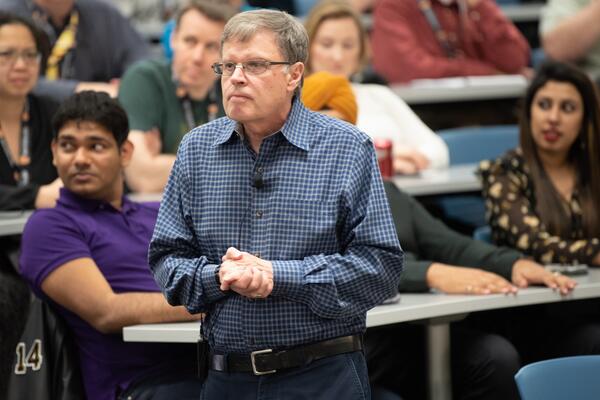
Building Square, a company of entrepreneurs
Jack Dorsey to University of Waterloo students: “We’d like to hire all of you . . . well, some of you at least.”

Jack Dorsey to University of Waterloo students: “We’d like to hire all of you . . . well, some of you at least.”
By Staff Communications and Public AffairsTwitter founder Jack Dorsey told students at the University of Waterloo on Thursday that his most recent venture, Square, is about “building a company of entrepreneurs.”
 “Everybody in our company is an entrepreneur,” said Dorsey of Square. “Twitter was not a startup. It started within another company.”
“Everybody in our company is an entrepreneur,” said Dorsey of Square. “Twitter was not a startup. It started within another company.”
Dorsey said being an entrepreneur means taking significant risk to do something. “Anyone can come in and they can change the course of the company,” he said.
Square lets business people accept credit card payments right on their mobile device with a card reader. The simple and inexpensive solution is hailed as a boon for small businesses once excluded from traditional payment systems.
After the talk, reporters were told that Square plans to hire 30 engineers and designers for its first Canadian office which will be based in Waterloo Region. The company had quietly opened a small office in the region in the spring but will be expanding operations here by 2014.
The idea for Square, said Dorsey, came about when his friend, a glass artist, lost a sale because he couldn’t receive payment for a $2,000 piece of art he created.
Square Wallet lets you pay without pulling out your wallet
Dorsey also outlined how Square has pushed beyond the card reader and is launching Square Register, Square Market, Square Cash and Square Wallet. With Square Wallet, your cellphone will know when you walk into your favourite coffee shop, said Dorsey. The store will get notification you are there and you’ll walk out with your cappuccino – paid for – without ever having to take out your wallet or your phone. Consumers will just pay with their presence, explained Dorsey.
Square Cash will allow you to send cash via e-mail. Through Square Cash, students can e-mail parents asking for $500 cash, for example, and as soon as a parent links their bank card to Square Cash they’ll be able to send money via e-mail. “It shows the power of commerce as a conversation,” said Dorsey. “This is a very, very simple thing.”
Square, based in San Francisco, processes $15 billion in payments annually and has three offices around the world. Dorsey brought Square to Canada last year. His talk on Thursday was hosted by C100, an organization of Canadian entrepreneurs in Silicon Valley, in partnership with the University of Waterloo and Communitech. After the talk, Dorsey joined an exclusive group of students and entrepreneurs for a private lunch.
Dorsey told the crowd his story – about how some of his businesses failed but how “sometimes you win the bet, and we’re still winning.” He also counseled students to go deep instead of broad in their interests, describing how he went from being a punk to a massage therapist and a tailor before becoming a tech executive. There was a time when he even dabbled with the idea of being a massage therapist for coders with sore wrists in San Francisco. At the time, he thought he could offer “code therapy” and massage therapy at the same time.
Dorsey told students to stick to their passions when starting a venture. “When you have that passion, and you want to see it in the world, you’re going to do whatever it takes.”

Read more
Upside Robotics secures new funding to accelerate the future of sustainable farming

Read more
Here are the people and events behind some of this year’s most compelling Waterloo stories

Read more
For more than four decades, Waterloo professor Larry Smith has helped build the University's reputation for innovation and entrepreneurial excellence
The University of Waterloo acknowledges that much of our work takes place on the traditional territory of the Neutral, Anishinaabeg, and Haudenosaunee peoples. Our main campus is situated on the Haldimand Tract, the land granted to the Six Nations that includes six miles on each side of the Grand River. Our active work toward reconciliation takes place across our campuses through research, learning, teaching, and community building, and is co-ordinated within the Office of Indigenous Relations.